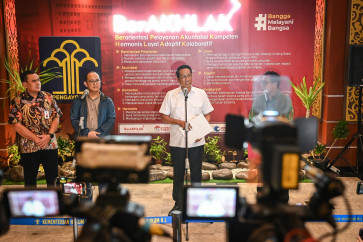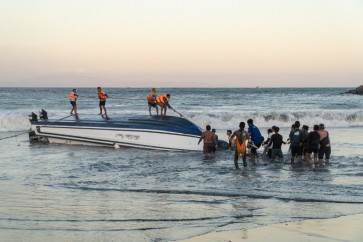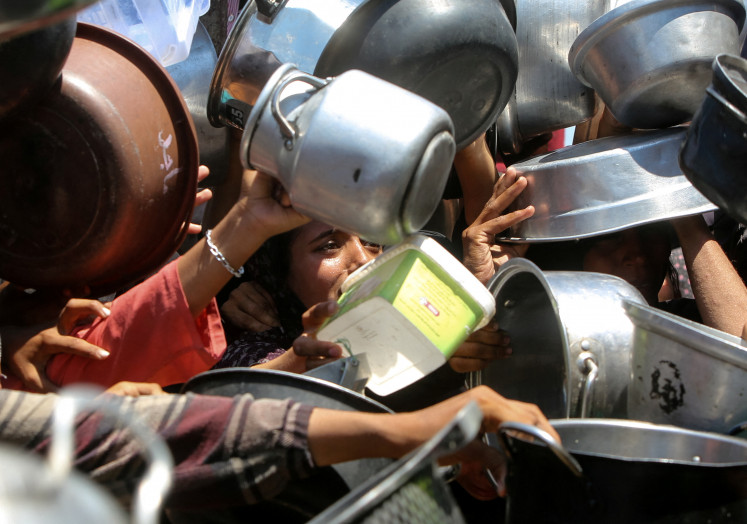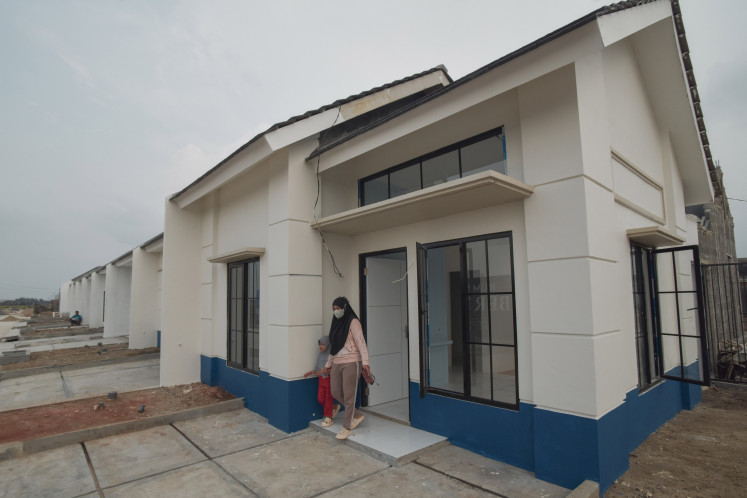Popular Reads
Top Results
Can't find what you're looking for?
View all search resultsPopular Reads
Top Results
Can't find what you're looking for?
View all search resultsGermany, RI can link up to strengthen ‘momentum for change’: Envoy
The Jakarta Post sits down with Germany’s new Ambassador to Indonesia, Ina Lepel, to discuss the prospects of a multilateral partnership between the two countries.
Change text size
Gift Premium Articles
to Anyone

Germany’s new Ambassador to Indonesia Ina Lepel arrives in Indonesia at an opportune time – just as Indonesia begins its year-long presidency of the Group of 20 (G20) biggest economies and the Group of Seven (G7) is led by Germany. The envoy sat down with The Jakarta Post’s Dian Septiari to discuss the prospects of the partners’ bilateral relations and how they can work together to advance the multilateral order and address global challenges.
Question: What are the key issues in the Indonesia-Germany bilateral relationship?
Answer: Indonesia is one of a very small number of global partners for our developing programs, which does not mean we do more projects anymore but we do big projects and they are all aimed at serving pressing global issues together.
At the moment, they are geared particularly toward climate change, carbon transformation and preserving biodiversity. A lot of our cooperation is dealing with these questions.
We also have a very active private sector. I’m very proud of what our companies are doing because they appreciate Indonesia as a venue for this cooperation.
It’s a very big market, it's an emerging market, and so of course I would like to see even more of that. But there’s also a lot of competition for the available investment from the private sectors of other countries, [...] so here we also have to work on how to bridge the gaps.
On people-to-people diplomacy and cultural relations, I’m very happy that we have between 4,000 and 5,000 Indonesian students that are pursuing their university studies in Germany, plus we have an increasing number of young Indonesians who have their vocational training in Germany. This is another field where we are proud to have Indonesians go to Germany. Hopefully, once the COVID-19 pandemic subsides, we’ll also again have more students and young researchers from Germany coming to Indonesia.
President Joko “Jokowi” Widodo says Indonesia needs international support to meet its various climate commitments. How is Germany supporting Indonesia’s energy transition?
We pretty much realize that it’s very difficult for emerging economies to handle the transition on top of all other development goals, so we are ready to support them. At the moment, we are supporting Indonesia in the field of energy with more than 2 million euros, and it’s a big [investment] portfolio covering many aspects.
There are also some projects to promote new generation capacity in renewables, in fields like hydro and geothermal energy. If they all can be completed as planned, we will be talking about 400 Megawatts [of power generation] in those fields. We are also working on smaller projects in eastern Indonesia to do with hybrid solar and battery power to improve the quality of excess energy production.
We also have considerable dialogue with the government on best practices and for the planning and regulations and for the governance of the energy sector, including on how to regulate smartly.
As we know from experience in Germany, it’s quite tricky to get it right. On one hand, it’s attractive to the investors, but at the same time it’s still competitive and does not lead to high prices for the consumers and for the companies that use the electricity.
We have experience from our own energy transition, but of course, energy transition works differently in every country.
Indonesia is starting its G20 presidency this month, are there any expectations from Germany regarding Indonesia’s ambitions?
Indonesia is taking over the G20 presidency during a very interesting global situation, and a crucial one at that. The pandemic has caused so much destruction. Everybody is reconsidering the way they see their economies and societies.
It's a time of change and that’s the time when Indonesia is taking the G20 presidency and when Germany is taking on the presidency of the G7 from Jan. 1, 2022. So both the G20 and G7 are in a situation where – probably – what political leaders in those groups decide will have huge implications for many important [issues].
Now may be an excellent opportunity to not just pick up the pieces from the pandemic, but to put them together in a new and more green and sustainable and resilient way for the future.
If all of those countries – especially the G20, which has the larger membership – can get it right, and get the right kind of consensus and momentum for all these important changes, [the better it is for all of us].
I think Indonesia’s overarching theme of “Recover together, recover stronger” has really hit the spot and its themes are totally important. I think about energy transition, global health and digital transformation – those are exactly the key changes every single country is reckoning with, which is important for the G20 to forge some consensus in order to prepare for a better future.
Can Indonesia and Germany work together by leading the G20 and G7 in concert?
I am quite confident, really. I think both our countries have a very multilateralist orientation and really abide by rules and consensus principles. I think it is interesting that Indonesia is the leading country within ASEAN and Germany is the strongest economy in the EU.
Still, both countries realize that they would not be able to go very far on their own, so both countries always for decades work for their regional organizations. That is one very interesting and very important paradigm and the same goes for the commitment of both countries in the United Nations and now we also have this informal [link] at the G20. I think we can use this experience in our other multilateral endeavors to make progress there as well.
Of course the G7 and G20 are different forums, but still there are overlaps when it comes to the issues that we have there. If there are good interactions between the two countries, it could really enhance this momentum for change.










